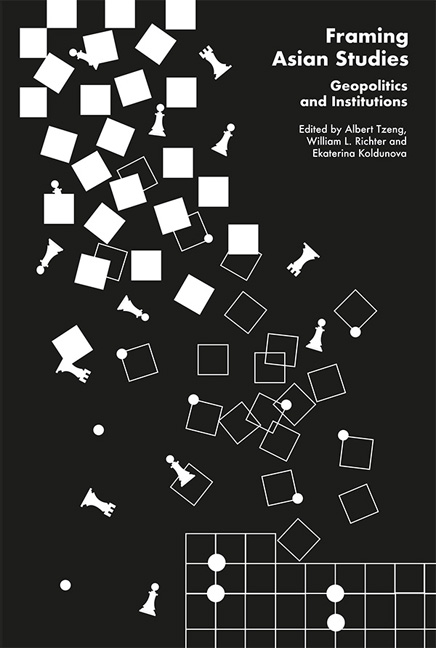Book contents
- Frontmatter
- Contents
- Foreword
- The Contributors
- 1 Introduction: Framing Asian Studies
- I Contested “Asia”
- 2 From Oriental Studies to Asian Studies: The Metamorphosis of the Western Mind
- 3 Geopolitical and Social Framings of Australia's “Asia Literacy”
- 4 Maps as Illustrations and Logos: Geopolitical Construction of Asia and South Asia
- II Geopolitical Framing of Western Discourse
- III Asian Studies in Former Soviet States
- IV Inter-Asian Gazes
- Index
3 - Geopolitical and Social Framings of Australia's “Asia Literacy”
from I - Contested “Asia”
Published online by Cambridge University Press: 28 June 2018
- Frontmatter
- Contents
- Foreword
- The Contributors
- 1 Introduction: Framing Asian Studies
- I Contested “Asia”
- 2 From Oriental Studies to Asian Studies: The Metamorphosis of the Western Mind
- 3 Geopolitical and Social Framings of Australia's “Asia Literacy”
- 4 Maps as Illustrations and Logos: Geopolitical Construction of Asia and South Asia
- II Geopolitical Framing of Western Discourse
- III Asian Studies in Former Soviet States
- IV Inter-Asian Gazes
- Index
Summary
One of the most salient, and longest-running, public discussions about Asian Studies in Australia is the “Asia literacy” agenda, which commenced in the early 1970s and has experienced discontinuous federal government funding through to present times. In essence, “Asia literacy” focuses on encouraging more Australian students to take up Asian languages and Asian Studies in Australian education systems. Much of the debate about Australia's “Asia literacy” has concentrated on the need for corresponding increases in education funding and other resources in order for participation targets to be achieved. This includes training and retraining programmes to boost the stock of “Asia-literate” teachers able to deliver these courses in Australian schools and universities.
To view Asia literacy in such narrow “supply and demand” terms or to focus on unmet participation targets, however, is to overlook the ways in which Asia literacy is framed by Australian geopolitical and social perspectives. Underscoring these concepts is a spatial assumption that “Australia” and “Asia” are separate geographical and cultural categories: that “Australians” cannot also be “Asians” and vice versa.
In this chapter, I argue that an analysis of Asia literacy reveals deeper truths about how Australians view “Asia” and their own geopolitical place in the world, as well as the make-up of Australian society. Asia literacy has been framed as an educational and geopolitical project aimed at “knowing Asia”, which has also been equated to knowing others. This dismisses the fundamental concept of Australians knowing themselves.
In this chapter, I first present a background of Australia's Asia literacy. I then separately examine geopolitical and social framings of Asia literacy. From a spatial perspective, which can also be thought of as the “where” of Asia literacy, I draw on Lewis and Wigen's concept of “metageography” to reveal the geographical and geopolitical assumptions that underpin Asia literacy, particularly in terms of thinking about Australia as part of Asia and as a member nation of an “Asian neighbourhood”. I then explore Asia literacy from a sociocultural viewpoint, which is a function of the “who” of Asia literacy. I use this perspective to analyse agency, and I consider Ang's work on “hybridity” as an alternative to the apparent “Australia” and “Asia” categories that permeate Asia literacy. Ultimately, these two perspectives of Asia literacy — geopolitical and social — demonstrate that concepts of space and place are fundamental to Australian framings of Asian Studies.
- Type
- Chapter
- Information
- Framing Asian StudiesGeopolitics and Institutions, pp. 44 - 63Publisher: ISEAS–Yusof Ishak InstitutePrint publication year: 2018



